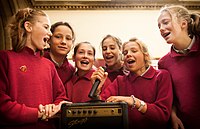
Photo from wikipedia
Previous studies have suggested that there are complex psychobiological effects of amateur choral singing on well-being. Here, we investigate the influences of singing vs. non-singing on psychological and biological measurements,… Click to show full abstract
Previous studies have suggested that there are complex psychobiological effects of amateur choral singing on well-being. Here, we investigate the influences of singing vs. non-singing on psychological and biological measurements, reflecting current positive and negative affect, perceived social connectedness, and physiological stress. We hypothesized that active singing leads to significant increases in these measurements compared to participating without singing. Amateur choristers (Exp. 1: N = 54, age range 18–85 years and Exp. 2: N = 49, age range 18–85 years) were tested in two experiments in which approximately half of the group was asked not to sing over periods of 30 (Exp. 1) and 60 min (Exp. 2), while the other half of the group sang. Dependent measures included scales for positive and negative affect and perceived social connectedness. In addition, saliva samples were collected to assess cortisol and alpha-amylase. The results revealed that singing activity had positive influences on affect measurements. However, significant increases in perceived social connectedness for singing were found only in Exp. 2. Biomarker changes were not significant across the experiments. Together, our findings suggest that both singing activity and duration of singing modulate psychological effects, with perceived social connectedness evolving over larger time spans than 30 min. Findings support the notion of beneficial psychological effects also for individuals, who report lower levels of general social support. The unexpected absence of biological effects warrants further investigation.
Journal Title: Frontiers in Behavioral Neuroscience
Year Published: 2018
Link to full text (if available)
Share on Social Media: Sign Up to like & get
recommendations!